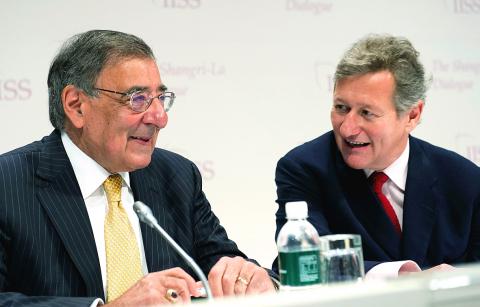There is “no other alternative” for the US and China but to boost military-to-military relations to manage disputes, US Secretary of Defense Leon Panetta said yesterday.
A robust security dialogue between the two powers is key to the prosperity of the Asia-Pacific region, Panetta told delegates to the Shangri-La Dialogue.
“Our relationship with China — we approach it in a very clear-eyed way. We are not naive about the relationship and neither is China,” he said in response to a question after a speech.

Photo: Reuters
“We both understand the differences we have, we both understand the conflicts we have, but we also both understand that there really is no other alternative but for both of us to engage and to improve our communications, and to improve our military-to-military relationship,” Panetta said.
Panetta said there would be “ups and downs” along the way, but it was vital to keep the lines of communication open.
“It’s to build that kind of relationship recognizing that we are going to have disputes ... that we are going to have conflicts, but also recognizing that it is in the interest of both China and the United States to resolve these issues in a peaceful way,” he said.
“That’s the only key to advancing their prosperity and to advancing our prosperity,” he added.
Before arriving in Singapore on Friday, Panetta told reporters aboard his plane that he had come away encouraged about the state of the US-China security dialogue after recent talks with his Chinese counterpart and other officials in Washington.
He said both powers must go beyond the mutual distrust that often characterized relations in the past.
“I think what both of us have to recognize is that we are powers in this region. We have common interests in this region, we have common obligations to try to promote peace and prosperity and security in this region,” he said at the Singapore summit.
In laying out core US principles in the region, Panetta made clear that Washington opposed any attempt by Beijing to make unilateral moves in its push for territorial rights in the oil-rich South China Sea.
Disputes had to be resolved through agreed-upon rules among all countries and based on international law, he said.
He also alluded to US concerns over China’s alleged cyber intrusions and spying, saying that in talks with Beijing the two sides had “agreed on the need to address responsible behavior in cyberspace and in outer space.”

Right-wing political scientist Laura Fernandez on Sunday won Costa Rica’s presidential election by a landslide, after promising to crack down on rising violence linked to the cocaine trade. Fernandez’s nearest rival, economist Alvaro Ramos, conceded defeat as results showed the ruling party far exceeding the threshold of 40 percent needed to avoid a runoff. With 94 percent of polling stations counted, the political heir of outgoing Costa Rican President Rodrigo Chaves had captured 48.3 percent of the vote compared with Ramos’ 33.4 percent, the Supreme Electoral Tribunal said. As soon as the first results were announced, members of Fernandez’s Sovereign People’s Party

MORE RESPONSIBILITY: Draftees would be expected to fight alongside professional soldiers, likely requiring the transformation of some training brigades into combat units The armed forces are to start incorporating new conscripts into combined arms brigades this year to enhance combat readiness, the Executive Yuan’s latest policy report said. The new policy would affect Taiwanese men entering the military for their compulsory service, which was extended to one year under reforms by then-president Tsai Ing-wen (蔡英文) in 2022. The conscripts would be trained to operate machine guns, uncrewed aerial vehicles, anti-tank guided missile launchers and Stinger air defense systems, the report said, adding that the basic training would be lengthened to eight weeks. After basic training, conscripts would be sorted into infantry battalions that would take

GROWING AMBITIONS: The scale and tempo of the operations show that the Strait has become the core theater for China to expand its security interests, the report said Chinese military aircraft incursions around Taiwan have surged nearly 15-fold over the past five years, according to a report released yesterday by the Democratic Progressive Party’s (DPP) Department of China Affairs. Sorties in the Taiwan Strait were previously irregular, totaling 380 in 2020, but have since evolved into routine operations, the report showed. “This demonstrates that the Taiwan Strait has become both the starting point and testing ground for Beijing’s expansionist ambitions,” it said. Driven by military expansionism, China is systematically pursuing actions aimed at altering the regional “status quo,” the department said, adding that Taiwan represents the most critical link in China’s

‘REALLY PROUD’: Nvidia would not be possible without Taiwan, Huang said, adding that TSMC would be increasing its capacity by 100 percent Nvidia Corp CEO Jensen Huang (黃仁勳) on Saturday praised and lightly cajoled his major Taiwanese suppliers to produce more to help power strong demand for artificial intelligence (AI), capping a visit to the country of his birth, where he has been mobbed by adoring fans at every step. Speaking at an impromptu press conference in the rain outside a Taipei restaurant, where he had hosted suppliers for a “trillion-dollar dinner,” named after the market capitalization of those firms attending, Huang said this would be another good year for business. “TSMC needs to work very hard this year because I need a lot